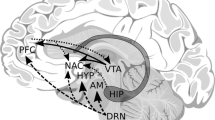Abstract
Rationale
Recent investigations suggest that stress reactivity may play an important role in the relationship between stress and substance use. Important gender differences, such as reasons for using substances, have been well documented, and it is likely that men and women also differ in their stress response.
Objectives
In this study, gender differences in stress reactivity to two laboratory stress manipulations were examined among 18 men and 21 women with current cocaine dependence.
Methods
Participants completed a psychological stress task, the Mental Arithmetic Task (MAT), and a physical stress task, the Cold Pressor Task (CPT). Subjective stress responses (i.e., feelings of stress, anxiety, nervousness, pain, mood), physiological stress responses (i.e., heart rate, skin conductance), and cocaine craving were assessed.
Results
In response to both the MAT and the CPT, significant increases in subjective and physiological stress were observed among participants. Women, however, demonstrated greater subjective reactivity, as evidenced by significantly higher ratings of stress, nervousness, and pain as compared to men. Women also immersed their hand in the cold water bath for a significantly shorter period of time as compared to men.
Conclusions
The current findings are among the first to report on gender differences in stress reactivity among cocaine-dependent individuals. The findings suggest that the mechanisms linking stress and substance use may be gender-specific, and that stress reactivity may play a different role for women than for men. Future research and implications for clinical interventions are discussed.



Similar content being viewed by others
References
Annis HM, Turner NE, Sklar SM (1997) IDTS: inventory of drug-taking situations. Addiction Research Foundation, Ontario Canada
Blume SB (1998) Addictive disorders in women. In: Frances RJ, Miller SI (eds) Clinical textbook of addictive disorders. Guilford Press, New York, pp 413–429
Brady KT, Randall CL (1999) Gender differences in substance use disorders. Psychiatr Clin North Am 22(2):241–252
Canturbury RJ (2002) Alcohol and other substance abuse. In: Kornstein SG, Clayton AH (eds) Women’s mental health: a comprehensive textbook. Guilford Press, New York, pp 222–243
First MB, Gibbon M, Spitzer RL, Williams JBW (2001) Structured clinical interview for DSM-IV-TR axis I disorders-research version. New York State Psychiatric Institute, Biometrics Research Department, New York
Goeders NE (2003) The impact of stress on addiction. European Neuropsychopharmacology 13:435–441
Green SB, Salkind NJ (2003) Using SPSS for Windows and Macintosh: analyzing and understanding data, 3rd edn. Pearson Education, Upper Saddle River, NJ
Jacobsen LK, Southwick SM, Kosten TR (2001) Substance use disorders in patients with posttraumatic stress disorder: a review of the literature. Am J Psychiatry 158(8):1184–1190
Karlsgodt KH, Lukas SE, Elman I (2003) Psychosocial stress and the duration of cocaine use in non-treatment seeking individuals with cocaine dependence. Am J Drug Alcohol Abuse 29(3):539–551
Khantzian EJ (1985) The self-medication hypothesis of addictive disorders: focus on heroin and cocaine dependence. Am J Psychiatry 142:1259–1264
Kreek MJ, Koob GF (1998) Drug dependence: stress and dysregulation of brain reward pathways. Drug Alcohol Depend 51:23–47
Marlatt GA, Gordon JR (1985) Relapse prevention. Guilford Press, New York
Niaura R, Shadel WG, Abrams DB, Monti PM, Rohsenow DJ, Sirota A (1998) Individual differences in cue reactivity among smokers trying to quit: effects of gender and cue type. Addict Behav 23:209–224
Randall CL, Roberts JS, Del Boca FK, Carroll KM, Connors GJ, Mattson ME (1999) Telescoping of landmark events associated with drinking: a gender comparison. J Stud Alcohol 60:252–260
Sharpley CF, Gordon JE (1999) Differences between ECG and pulse when measuring heart rates and reactivity under two physical and two psychological stressors. J Behav Med 22(3):285–301
Sinha R (2001) How does stress increase risk of drug abuse and relapse? Psychopharmacology 158:343–359
Sinha R, Catapano D, O’Malley S (1999) Stress-induced craving and stress response in cocaine dependent individuals. Psychopharmacology 142:343–351
Sinha R, Fuse T, Aubin LR, O’Malley SS (2000) Psychological stress, drug-related cues and cocaine craving. Psychopharmacology 152:140–148
Sinha R, Talih M, Malison R, Cooney N, Anderson GM, Kreek MJ (2003) Hypothalamic–pituitary–adrenal axis and sympatho-adreno-medullary responses during stress-induced and drug cue-induced cocaine craving states. Psychopharmacology 170:62–72
Sobell LC, Sobell MB (1992) Timeline follow-back: a technique for assessing self-reported alcohol consumption. In: Litten RZ, Allen JP (eds) Measuring alcohol consumption: psychological and biochemical method. Humana Press, Totowa, NJ, pp 41–65
Spielberger CD, Gorsuch R, Lushene RE (1983) Manual for the state-trait anxiety inventory. Consulting Psychologist Press, Palo Alto, CA
Steiner H, Ryst E, Berkowitz J, Gschwendt MA, Koopman C (2002) Boys’ and girls’ responses to stress: affect and heart rate during a speech task. J Adolesc Health 30S:14–21
Author information
Authors and Affiliations
Corresponding author
Rights and permissions
About this article
Cite this article
Back, S.E., Brady, K.T., Jackson, J.L. et al. Gender differences in stress reactivity among cocaine-dependent individuals. Psychopharmacology 180, 169–176 (2005). https://doi.org/10.1007/s00213-004-2129-7
Received:
Accepted:
Published:
Issue Date:
DOI: https://doi.org/10.1007/s00213-004-2129-7




